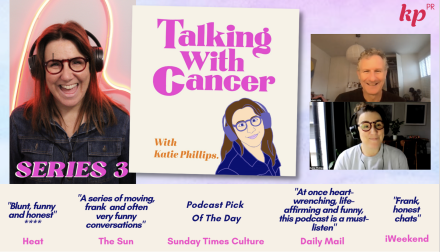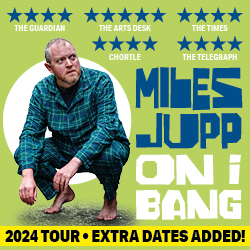
In a new episode of the podcast ‘Talking With Cancer’ (out today – listen here), comedian and presenter Adam Hills MBE has talked openly and honestly about losing his father to leukaemia in 2013, just as he was starting out as host of the hugely successful Channel 4 show The Last Leg. In a wide-ranging interview, Hills talked about feeling fortunate to have been at his dad’s side when he passed, building the confidence as a comedian to talk about his prosthetic leg on stage, and feeling validated in his job and purpose as a comedian while his dad was ill.
Talking With Cancer is a weekly podcast started and hosted by entertainment publicist Katie Phillips in 2022, after she was diagnosed with thyroid cancer in February of that year. Documenting her journey and treatment, the recent third series has also seen Katie having fascinating, illuminating conversations with a broad selection of guests, who have been sharing insights as to how cancer has impacted on their own lives, either personally or within their profession. Today’s conversation with Adam Hills (listen here) concludes the third series, with a fourth to follow later this year.
Adam Hills lost his dad to leukaemia in early 2013, at the same time as his television career was taking off in London, as host of the new Channel 4 programme The Last Leg. Throughout the interview, Hills talks openly about his dad’s diagnosis, feeling like he needed to be back in Australia with him and experiencing ‘positive denial’. He also tells of one of his final days spent with his dad, who said to him with an unusual determination when he was leaving, ‘Good luck in London’: a tender moment that Hills often thinks of as the cameras start rolling on The Last Leg, as a reminder that he’s where he’s meant to be.
Adam Hills: “After The Last Leg finished in 2012, Channel 4 weren’t quite sure what to do with The Last Leg – we were a Paralympics show. But Stand Up To Cancer was on that year, so they asked Josh, Alex and I to sit together on a couch one afternoon and ask each other some ‘Is It Ok?’s. We made each other laugh for like 20 minutes, and the chemistry was really there. We went out to lunch afterwards, and I said to them, ‘Look, C4 want to keep us on as a regular thing and I think when the cameras go on, something really special happens.’ That just proved that we didn’t only have to talk about Paralympics… we just talked about cancer for 20 minutes, and we made it funny, but we also made it good and made it worthy. There was only one other TV show I’d done where I’d had that chemistry with people and that was a show in Australia that I hosted called ‘Spicks and Specks’ and that ran for seven years, and we did 300 episodes. So I felt like we were on to a thing. We went to the channel and they gave it a crack.
“I remember when I was back in Australia later on in 2012, over Christmas, and my dad’s still going through the illness at this point. I had this afternoon when I went straight from the airport to the hospital and just spent a whole day with my dad. I was telling him about all the things that I’ve been doing over in London, and he was generally with it at that point. So I got to explain to him about The Last Leg and the Paralympics and how it had taken off, Channel 4 wanted to make more and we were about to make another series… all of this stuff.
“After we had a little Christmas Day and I said goodbye to him, he looked at me with real determination, and he said ‘Good luck in London’. He said it as if it was almost like a final thing. In my head, I think he knew then that he was on the way out, and I’d like to think - and I’m probably projecting but I might not be - that he also knew that I was on the right path and that things were going to work out for me. ‘Good luck in London’ was almost like he was saying ‘that’s where you should be’ and ‘it’s going to be fine’.
“Every now and then, before an episode of The Last Leg, when the music is playing, the opening titles are playing and the audience start applauding just before the camera comes on me… every now and again I’ll just remember my dad saying ‘Good luck in London’, and it just reminds me that this is where I’m meant to be. I’m in the right spot.”
Hills talks about gaining an added sense of purpose in his dad’s final days – while the doctors were no longer able to do anything for him, as a comedian, Adam was still able to make his dad laugh in his hospital bed.
Adam Hills: “My dad’s friend once said to me, ‘I guess this must be really hard for you as a comedian… you probably won’t want to be funny for a while, but I’m sure it’ll come back.’ I remember thinking, ‘no, this has made me more convinced that I need to be funny’. Partly because I wanted to talk about it, but I remember there being a moment where I saw my dad in intensive care, when he was at his worst. He just shook his head saying ‘there’s nothing more we can do’. I remember thinking ‘I can still make him laugh’.
“As a comedian, you always think ‘I probably should have done a proper job... I probably should’ve been a doctor, I probably should have saved lives.’ But at that specific moment the guy standing in front of me, trained as a specialist in his field, couldn’t do anything for my dad. Whereas I could. I could still make him laugh or smile in his last moments.”
Hills’ dad had 15 years earlier been diagnosed with Non-Hodgkin Lymphoma, which he fought through and went into remission. Adam and Katie discussed how, often, being told you’re clear of cancer can be harder than being told you have cancer; there are then so many unknowns.
Adam Hills: “He was fine, and he went into remission and then there’s that moment that I know a lot of people who go through cancer have, which is when the doctor says, ‘I don’t need to see you anymore’. And that hit him harder than anything because he was like, ‘well, how do I know I don’t have cancer?’”
Katie Phillips: “I’m so interested in that as well… how do people reintegrate into normality? How do you do that? That’s so interesting that you say that was in some ways maybe even harder than being told he had cancer.”
Adam Hills: “It wasn’t the relief that you’d think it would be… I remember him saying that ‘I should be relieved that I don’t have to go back to the doctor any more, but all I can think is ‘how am I going to know?’ What if it comes back? How am I going to know that it hasn’t come back?”
Elsewhere in the conversation, Adam also spoke to Katie about being born without a right foot, and how it took him 13 years to talk about his prosthetic leg on stage, once he’d built his confidence as a comedian.
Katie Phillips: “One of your early stand-up shows was called ‘Happy Feet’. I realise now looking back quite how ground-breaking that was at the time, to talk about something so personal and taboo.”
Adam Hills: “I was born without a right foot. To be honest, it goes back to when I started out doing comedy – I was at the Sydney Comedy Store one night, hosting the early & late shows. There were about five people booked in for the late show and about 40 people from the early show stayed on so they had all seen all my material… I didn’t want to do the same jokes, so I tried to talk about whatever I could, and I made a joke about having one leg.
“I remember afterwards one of the older comics - he was a bit full of himself - but he made a point to me, and he had a good point. He said, ‘You’re not good enough to talk about your foot yet. You’re still working out how to be funny and what you want to say and how you want to say it. You need to wait until you work out how to be really good at comedy and work out what you want to say about your foot, then you need to talk about it.’”
Katie Phillips: “Well, that’s kind of smart.”
Adam Hills: “It was really smart, and I didn’t talk about it on stage for 13 years.”
‘Talking With Cancer’ is available to listen to on all podcast platforms, with weekly episodes released on Tuesdays.






